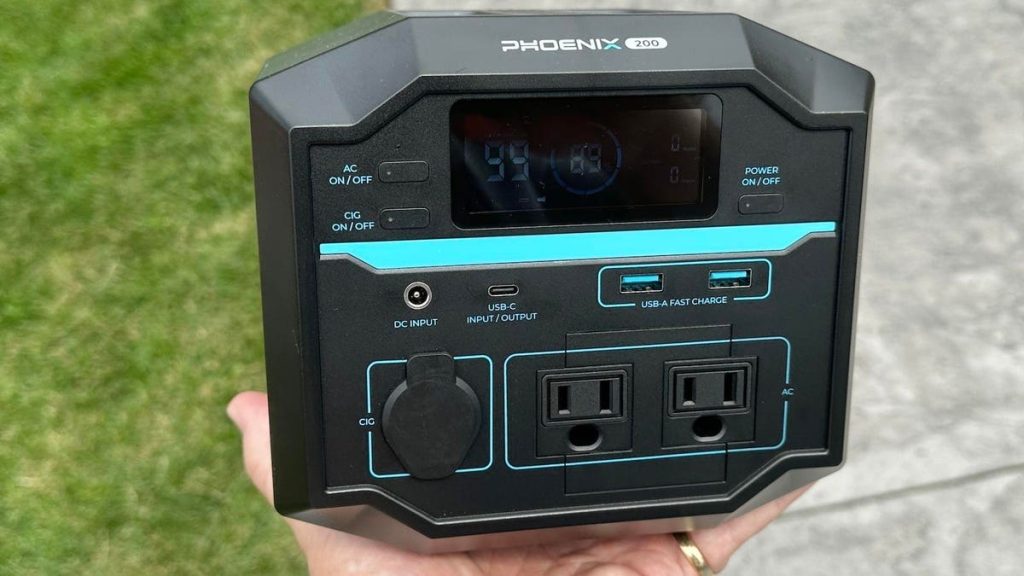The combination of increasing severe weather events (which can cause power outages), a boom in outdoor activities like camping, and mainstream adoption of Lithium Ion batteries has led to a golden age for portable power stations. Forget the old lead acid battery versions that used to be found in the camping section of hardware stores. Those weighed a ton and their primary use was to provide emergency lighting for a few days. Maybe you might be able to run an AM/FM radio off them. However, not everyone needs–or wants to pay for–a modern Lithium Ion battery power station that could keep their refrigerator running for two or three days.
There is still a place for a more modest power station that is truly portable, truly affordable, but still able to charge everything and even run small household devices. I just wrapped up testing on one such solution: the ultra-portable (just over 5 lbs), affordable (just over $200) Renogy Phoenix 200.
Truly Ultra-Portable
While its price brings power station capabilities to a far wider demographic, to me it’s the compactness of the Phoenix 200 that really stands out.
This thing is roughly 7.5 x 6.1 x 7.0 inches and weighs just 5.29 lbs. That’s with the battery itself, built-in cooling, an integrated handle, a good-sized LCD display and a wide range of output ports. It’s not just portable, it is ultra-portable. Renogy “cheats” a little by putting the AC recharging outside the unit in the form of a sizeable power brick, but it’s still a pretty impressive bit of engineering.
Still Highly Capable
A portable power station in the $200 range that weighs just a notch over 5lb might not sound like it would be capable of doing much. However, Renogy has managed to stuff a high capacity 222Wh Lithium Ion battery with advanced battery protection technology inside. It has dual, 120V AC outlets delivering up to 200W (400W surge) of Pure Sine Wave power. In addition there are dual fast charge USB Type-A charge ports, USB-C and 12V DC output. The power station supports pass-through charging and can power/charge multiple devices simultaneously.
The built-in LCD display is bright, sharp and displays the info you care about when using the power station or recharging it. You can turn the display on at any time by tapping the power button and it will automatically shut off after a minute or so to save power.
Recharging can be done with the included power adapter, which took me about four hours on average, with a barely-audible fan noise at times. You can also recharge with the USB-C port or the included car charger. There is even support for charging with an optional solar panel.
What can you do with the Renogy Phoenix 200? Besides being able to recharge your smartphone for a week, you can run small electrical appliances for short times. I plugged in a 30W desk fan and it ran at the low setting for six hours. That’s nothing compared to a 1500Wh power station, but it’s enough to make life a lot more pleasant during a short, summer power outage–at a fraction of the price of the bigger power stations and in a package you can easily carry instead of having to lug around.
Renogy Phoenix 200 Power Station Recommendation
The Renogy Phoenix 200 is not meant to offer a way to run your refrigerator during a power outage. However it is a true successor to those lead acid battery power stations from the 1980s. It’s reasonably priced instead of being an investment and extremely lightweight. Anyone can easily carry it. But it is built with the latest in battery technology and offers Pure Sine Wave AC outlets, so instead of being limited to keeping the lights on, you can plug in and run small appliances like fans, keep critical tech like CPAP machines running for a short time, run a laptop and charge your phone. It has a great little LCD display that shows you the critical stats, most importably what percentage of a charge remains.
If you want the peace of mind of an emergency battery power station for blackouts, camping, or powering devices when an electrical outlet isn’t handy, the $209.99 Renogy Phoenix 200 with 220Wh of power is a great option that won’t break the bank–or your back.
Disclosure: Renogy provided a Phoenix 200 for evaluation purposes but had no input into this review.
Read the full article here










